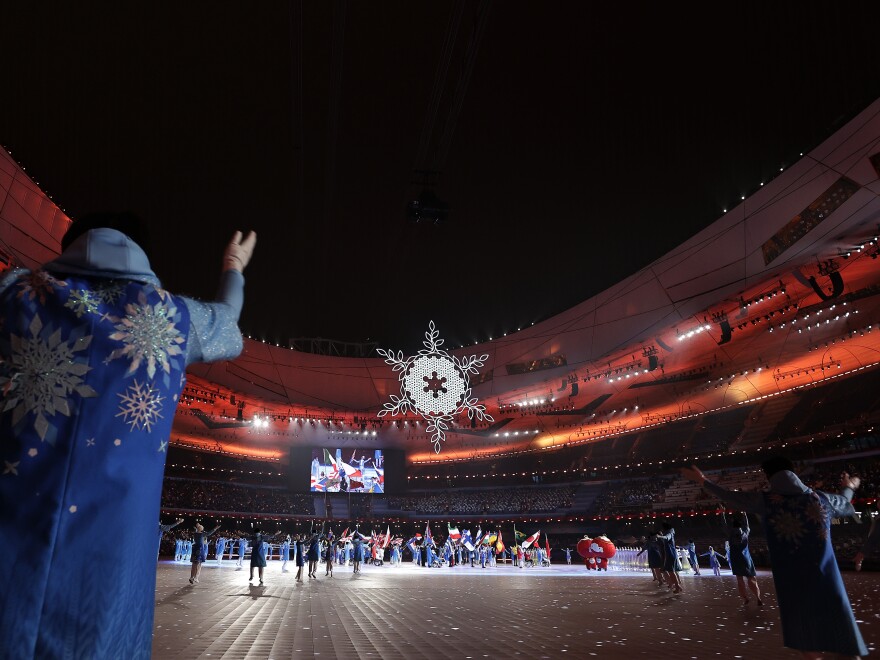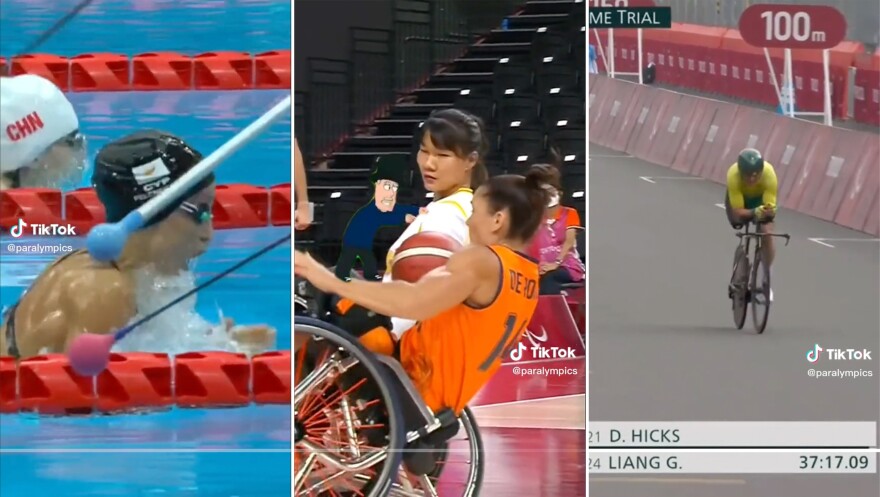The next Paralympic Games are more than a year away, but they are top of mind for many thanks to their official — and controversial — TikTok account.
The account, which has over 3 million followers, posts highlight reels of Para athletes: world-class competitors with impairments that fall into 10 categories including limb deficiency, impaired muscle power and vision impairment.
Some of the Paralympics TikToks explain how the equipment and adaptations work for different sports, like penalty kicks in blind football or the assisted boccia ball setup. Most are set to viral social media sounds or songs — and many show the athletes falling or crashing into each other.
One video plays footage of Australian cyclist Darren Hicks, who had his right leg amputated after a crash, winning a time trial gold medal at Tokyo 2020. The audio is a popular TikTok song that's been modified so the only audible word is "left." It's gotten 4.8 million likes.
A slow-motion replay of a wheelchair basketball player falling backwards onto the floor is accompanied by the Family Guy version of "Walk Like An Egyptian" ("My back is hurting from the chair I'm sitting on ... if I lay down flat on the floor it usually kinda fixes it"). In another, noises from the electronic game "Bop It!" play as blind and vision-impaired swimmers get tapped on the head with foam-tipped poles, which the account explains is how they are notified they're getting close to the wall.
Many of the videos have millions of likes and scores of comments from incredulous viewers, who seemingly can't believe what they're seeing is from the verified account. (Other comments, from both the account and other viewers, are focused on the sport and the athletes' feats.)
The TikTok account has been active for years. But it sparked outrage last week after several popular Twitter accounts, including Barstool Sports, shared compilations.
Paralympics TikTok admin is CRAZY pic.twitter.com/3OlTnic7xJ
— Barstool Sports (@barstoolsports) April 17, 2023
Many slammed the account on social media for what they saw as mocking the athletes and downplaying their accomplishments, describing it as "disrespectful," "evil," "gross" and "ableism for views." There have been calls for the firing of whoever is behind it.
"Bit weird that the offical [sic] paralympics tiktok has so many videos mocking their own athletes," reads a tweet by a user named Yasmin. It got more than 178,000 likes and nearly 11,000 retweets.
She also shared side-by-side compilations of videos from the Paralympic and Olympic accounts — the latter shows athletes training, competing and receiving medals — to draw attention to the perceived difference in tone.
see for yourself the difference between the official paralympics account’s content and the official olympics account’s pic.twitter.com/WDElTVufbo
— yasmin (@ycsm1n) April 17, 2023
Disability rights advocate Imani Barbarin said on Twitter that the Paralympics videos "have no voice and they have no perspective."
"Not only that, but if you use certain audios with disabled people, the context changes almost entirely ... and that's the entire page," she added.
The reaction to the Paralympics TikTok videos has been overwhelmingly negative — but not entirely so. Those who run the account, and some of the athletes who have been featured on it, say it's an important way to increase visibility.
While the number of Paralympic participants has grown in recent years, their viewership lags considerably behind those of the Olympics. For example, NBC's primetime coverage of the 2020 Olympics averaged 15.5 million viewers per night — while 14 million people tuned into the entire course of the Paralympics.
A spokesperson at the International Paralympic Committee (IPC) — which runs both the account and the games — told NPR in an email that the criticisms seem to be coming primarily from people who do not have disabilities and may not be aware that the account is run by a "Paralympian who fully understands disability."
He added that the account has a lot of support from Paralympic athletes as well as audiences.
"We have created a strong following through edgy and unique content that allows us to educate an audience who might be less aware of Paralympic sport and the achievements of our athletes," he added. "We appreciate that not everyone will like the content and sometimes we don't get it right, but we do closely monitor posts, always converse in reactions to them, and learn from all feedback."
The people behind the account want to educate new audiences
The IPC spokesperson said the Paralympics TikTok provides a valuable way to connect with younger audiences "about the power of Para sport as a tool for driving social inclusion."
The account's first viral video, in September 2020, was of two wheelchair basketball players maneuvering on the court to Jack Harlow's "What's Poppin."
IPC digital media coordinator Richard Fox told AdWeek that was when the team realized the power of TikTok in showcasing Paralympic sports to people outside of their bubble.
And Fox, a former Paralympian who has been involved in Para sports since the age of 10, said he didn't want those videos to amount to "inspiration porn."
"I wanted to showcase people with disabilities doing sport, but in a different way to how it's been done previously," he explained. "And so by using the viral sounds and by using the trends, that's how we're doing that."
Fox wants the account to be informative, too. He said he spends up to an hour monitoring comments on each video after posting it, both to respond to comments and answer peoples' questions about the videos and Paralympic sports in general.
They've no doubt seen the critical comments, too. In an AdWeek video, Jonas Oliveira, head of content for the IPC, asks whether those critics would be asking the same questions if the subject of the videos were Olympic rather than Paralympic athletes.
"There shouldn't be a difference in the way that you treat athletes, be it Olympians, able-bodied athletes or athletes with disabilities," he said.

Some athletes are defending the account
The few Para athletes who have spoken publicly about the account offer varying perspectives, though many agree it's a delicate balance to strike.
Amputee soccer player Sean Jackson told the BBC that he's disappointed the account is focusing so much on athletes' mistakes instead of their skills.
"They just choose to sort of mock them and turn them into memes and try and use their sport to entertain people from a comedic point of view," he said.
Several athletes who have been featured on the account told news outlets that they didn't take offense.
Hicks, the cyclist, told NBC News he wasn't aware of the viral Barstool tweet that featured his video — and had no issues with the original.
"I don't feel like they are mocking me, rather just using a song which uses the word left, and I happen to be pedaling with only my left leg," he said.
André Ramos, a bronze medalist in boccia who was also the subject of a TikTok, told the outlet that "making fun with our handicaps is a sign that we accept ourselves as we are and that others do not see the disability as a difference."
Other athletes agree that humor can help raise awareness and normalize differences.
Parasurfer Liv Stone told AdWeek that she appreciates the account isn't "pushing awareness ... in your face," while wheelchair basketball player Jess Whyte told the BBC that "if we're going to celebrate the great things, we can also laugh at the funny things."
Brad Snyder, a six-time Paralympic gold medalist — most recently in paratriathlon — who was blinded by an IED in Afghanistan, was also fine with the video he appeared in last year.
It shows him being led from the water to his bike by a guide and reaching carefully for it — a gesture that the TikTok described as "air piano" and scored accordingly.
Snyder told CNN that he found the video funny and reposted it at the time. But he also acknowledges that there's a fine line between cheeky and disrespectful, and that no one person can "fully understand the gamut of disability."
That said, he appreciates that the account is using sports and humor to try to bridge that gap.
"And now let's have a conversation about what my experience might be like and what my challenges might be, and how you as an able-bodied person, might be able to understand and accommodate me in various ways or help me cross the street or help me without pitying me and those sorts of things," Snyder said.
Copyright 2023 NPR. To see more, visit https://www.npr.org.



